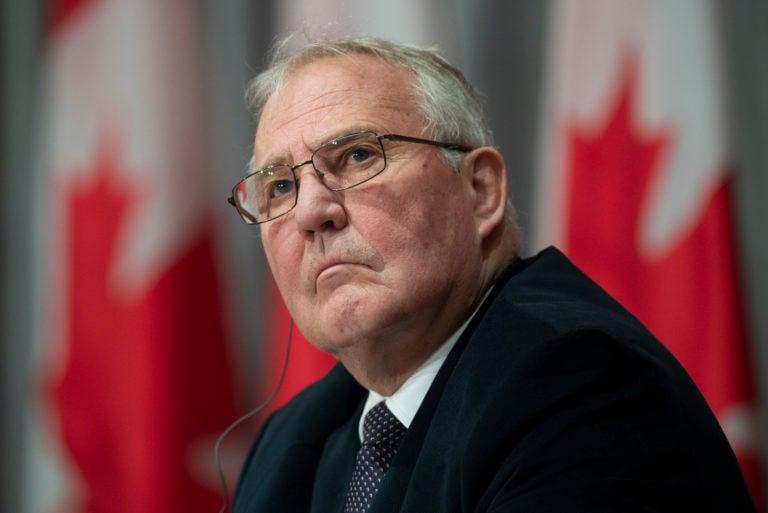The Nova Scotia shooting ‘review’ and the deafness of government
Paul Wells: Everyone was demanding a public inquiry. What we got was something zero people asked for—a toothless, rickety review panel.

Blair attends a news conference on June 9, 2020 in Ottawa (CP/Adrian Wyld)
Share
We might as well give it a name, this odd feeling of having been heard, understood—and ignored—by government.
It’s a familiar enough sensation, after all. It’s not that the lines of communication have broken down. It’s not that the message isn’t getting through. It’s not even that governments are inert or inactive. On the contrary, they’re whirlwinds of action. They’re just doing… something else… besides what circumstances warrant and populations demand.
This odd feeling is all I have after Mark Furey, Nova Scotia’s justice minister, and Bill Blair, the federal minister of public safety, announced the end of three months of confusion about how governments would respond to the April mass murder around Portapique, N.S. They’re convening a review. It’s like a public inquiry, only toothless and secretive. But look, they’ve put nice people in charge of it!
As recently as Wednesday, hundreds of people, many of them relatives and friends of the people Gabriel Wortman shot dead on April 18 and 19, marched in Bible Hill, N.S., demanding a full public inquiry into the murders. They are joined in this call by several of the country’s most prominent women’s groups; dozens of senators, including most of the senators Justin Trudeau has appointed; and much of the Dalhousie University law faculty.
Here’s the Nova Scotia Public Inquiries Act. It’s six paragraphs long. Two of them ensure that inquiries will have the power to compel witnesses to testify under oath. That’s central. As the women’s groups put it, “We wish to express our grave concern about, and opposition to, the use of any process for the federal-provincial response to the Nova Scotia mass shooting which is not fully open and public or which does not mandatorily compel the pertinent institutions and state actors to provide relevant information.”
So that’s who asked for a public inquiry. Who asked for an independent review panel? Give Furey credit for this much: When I asked him, he admitted nobody had. That’s zero people.
The rickety claptrap Furey and Blair announced will be backed by stern letters from both ministers ordering organizations they’re responsible for to cooperate with the review. That list includes “RCMP, the Canada Firearms Program, the Canada Border Services Agency, the Criminal Intelligence Service and the national Alert Ready Program.”
What happens if an organization ignores a stern letter? Well then, by God, the review panel can… complain to Blair and Furey (or their successors; the review panel is to report by August, 2021, which may well be after Nova Scotia and federal elections). If that doesn’t get the recalcitrant agencies to play ball, well then, by God, the review panel can… say so, in public.
Stop, or I’ll shout “stop” again.
What’s to stop an RCMP officer from, say, retiring from the force and suddenly being institutionally out of reach of the review panel? Nothing, but thanks for asking. What’s to ensure you and I can see the testimony so we know whether it’s reflected in any final report? Nothing. There’s no provision for any public testimony, let alone for subpoena power or sworn veracity.
The ministers put great emphasis on the fact that interim and final reports from the panel will be public. They were extravagant in their praise for, as Furey put it, the “competence” of the panellists, who are led by former Nova Scotia Chief Justice Michael MacDonald and include former Fredericton police chief Leanne Fitch and Anne McLellan, the former federal justice minister who gets called for everything these days.
I agree they’re competent! But in our system (I find myself having to explain, as if to a child), we don’t send people into public tasks armed with only their competence. We normally like to arm them with an apparatus of law. Anne McLellan was competent before she had the authority to introduce laws in Parliament. But it was the authority that made her a minister of the Crown. Leanne Fitch was competent before she had the authority to administer lethal violence. But it was the authority that made her a cop.
I know Furey and Blair know this. Their news conference was an exercise in saying obvious things while ignoring other obvious things, for reasons about which we can only speculate until one of them writes his memoirs. In that gap between the act and the explanation, a gap that will certainly last years, lies the latest erosion of our sense that we are understood by the people who get to confiscate our money and tell us what we are permitted to do. It’s alienating.
Before the ministers’ announcement, I asked Dalhousie University law professor Archibald Kaiser for some comment on the delay in announcing any sort of inquiry. Kaiser sent me a long, thoughtful essay. “Instead of reassuring the public, the behaviour of governments has been opaque, tardy, uncertain, avoidant and condescending,” he wrote. “It is hard to make sense of why there have been so many bungles and missed opportunities in the aftermath of Canada’s worst mass killing.”
Probably this… thing the ministers have concocted will be better than nothing. Certainly the two governments’ amen corners will activate on Twitter to warn us that if we are ungrateful, other parties might replace them in government, and then where would we be. This is our lot: government by slogan, diversion and threat. Surely there should be a name for that.